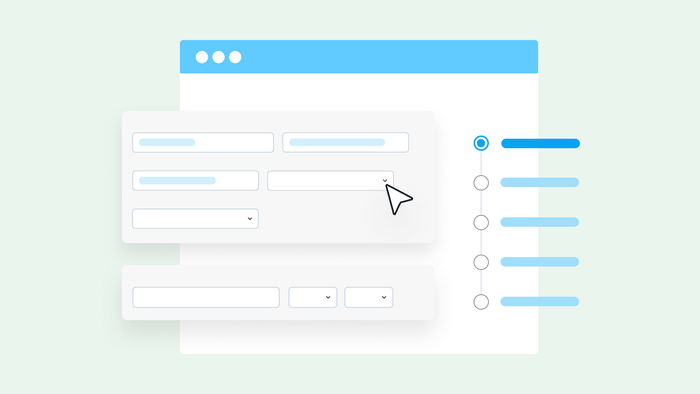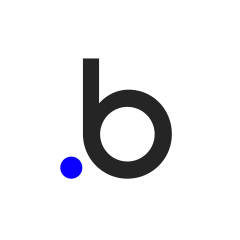You have an idea for a project: maybe it’s a web app for your neighborhood, an internal tool for your day job, or a mobile app for a new business venture. Now what? The prospect of finding a developer to build your project can feel like a giant mystery, especially when you’re trying to get to market quickly — but it doesn’t have to.
Requests for proposals — or RFPs — are common across many industries. Think of an RFP as a detailed summary of your project that app developers can browse and respond to. By sharing details like your budget, timeline, and desired features, developers can raise their hand to share a proposal, and you can interview potential partners for your project.
Just like apps aren’t one-size-fits-all, RFPs aren’t one-size-fits-all, either. We’ve seen thousands of RFPs come through our portal over the years — some with impressive thought and detail, others with lots of room for improvement. As you embark on your app journey, here are a few pointers on how to set yourself up for success and hire a trusted partner for your project.
3 things to consider before you write your RFP
You don’t need to have your entire app design and business model fleshed out to start writing an RFP — but there are some things you’ll want to think through before you put pen to paper.
How developed is your idea?
Take a realistic assessment of your idea: Do you need a partner to help you build out the business model, develop designs, think about edge cases, etc.? It’s OK if your idea is still in the early stages, but knowing where you stand will help you identify a good match for your needs.
Some signs you have a well-developed idea could include:
- You’ve crafted a written product vision
- You’ve defined your must-have (MVP) features
- You’ve created wireframes or mockups
- You have a user flow diagram that shows how different pages in the app will connect to one other
- You have a product roadmap that details what features you want to prioritize in what order
Do you want to work with a solo freelancer or a team?
Agencies tend to have larger teams with specialized roles — for example, staff who can help support project management or design functions. They also tend to be more structured with the processes they follow with clients. Freelance developers often have a range of skillsets, and tend to be more flexible when it comes to how they work with clients. There’s no right or wrong choice — it comes down to personal preference and what kind of support you’re looking for.
What services will you need?
For example, do you need help with product design? Maybe plugin development? Or maybe you're just looking for some coaching. Also, do you need help with a one-time project or ongoing support? Some developers specialize in turning your idea into a product, but they don't generally offer app support beyond that. On the other hand, some will help you ship your product and then work with you for as long as you need, on a retainer contract.
How to hire a Bubble Developer for your app
Now that you’ve thought through the strategic pre-work, it’s time for the exciting part: heading to our (recently revamped!) Hire a Developer portal to submit an RFP.
To date, thousands of founders have submitted RFPs through the Hire a Developer portal because they know that Bubble Developers build on the most powerful full-stack web app development platform. They create complex apps faster than traditional developers — and you can maintain your own app after your project is done.
Plus, you’re in good hands: Our RFP system will match you with best-in-class tiered agencies and developers. To maintain their tier status, agencies are required to meet a certain threshold of Bubble-Certified Developers, and freelancers who participate are required to be certified. This means they’ve passed a rigorous exam on all facets of the Bubble platform.
Get started by filling out the Hire a Developer portal form. While many fields are optional, it’s helpful to specify as may details as you’re able — like primary language, services, budget, etc. — so we can find the best match for your specific project.
It’s totally normal to not be 100% certain about every detail. You can always adjust project details after you’ve connected with potential developers, and it’s common for feature specs and project parameters to change once you get into the nitty-gritty.
The five steps of Bubble’s Hire a Developer portal
- Enter your basic information and share a bit about yourself
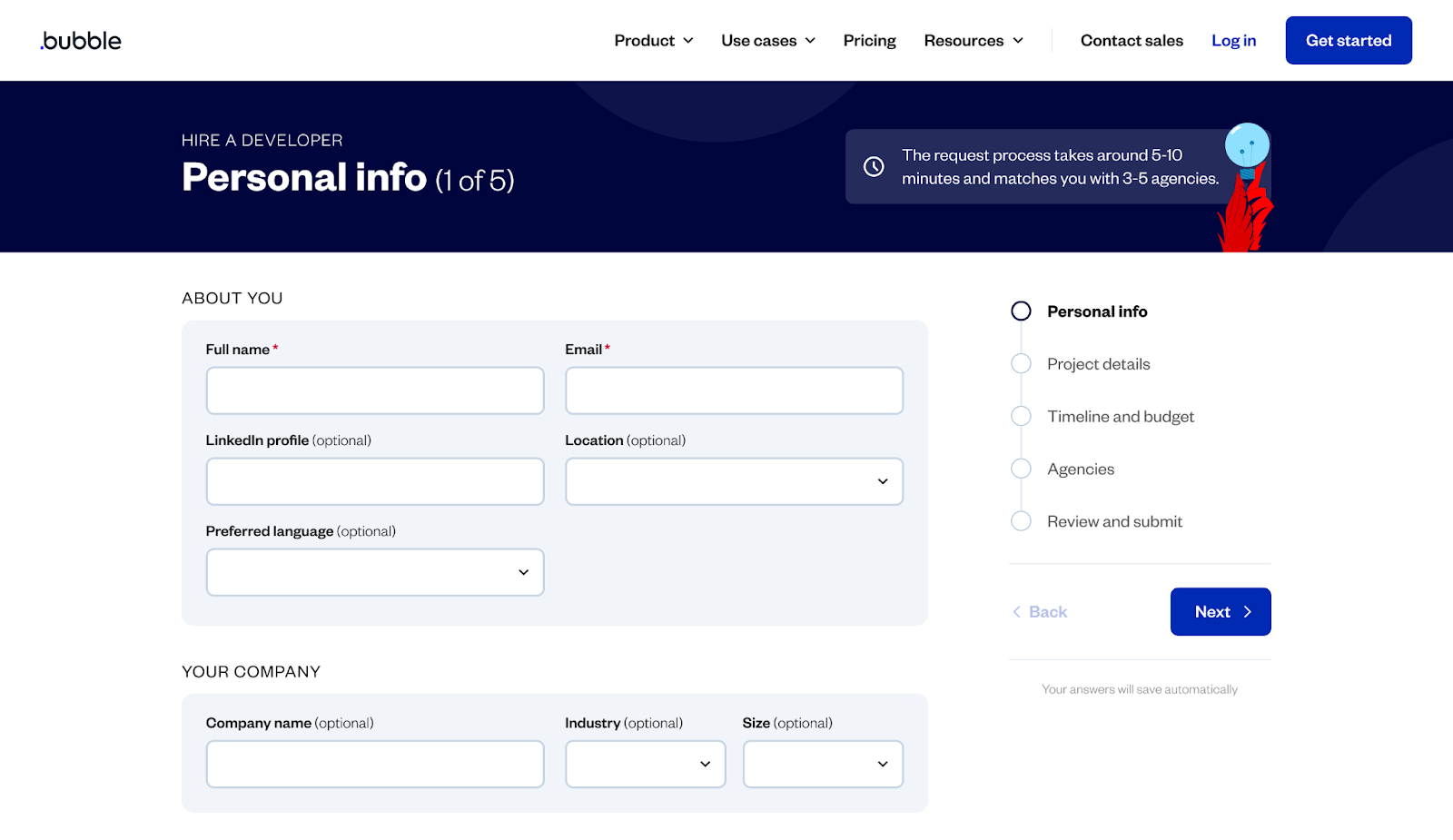
- Describe your project details (more on this below!)
- Set your timeline and budget
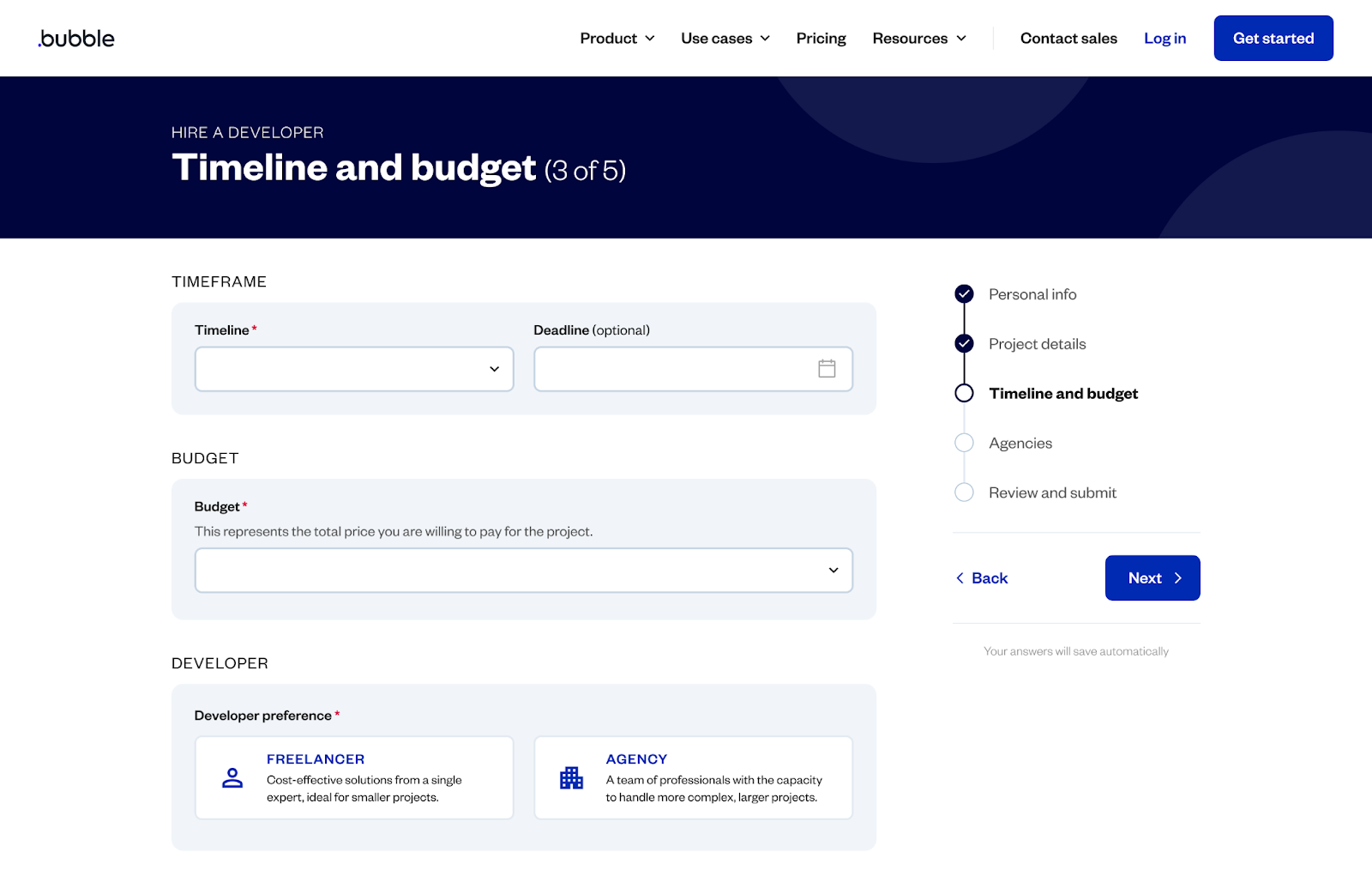
- Browse potential agency matches
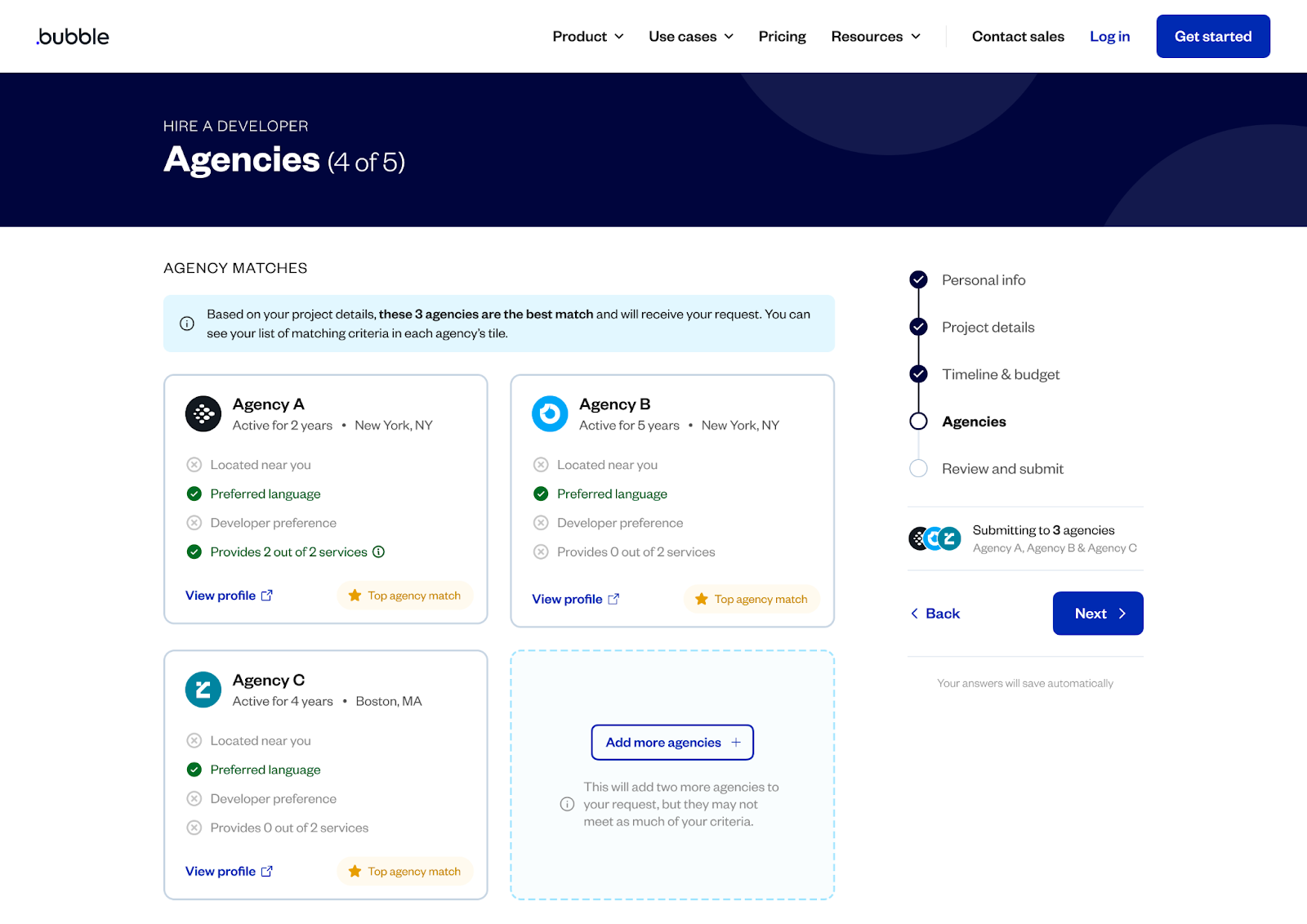
- Review and submit your RFP
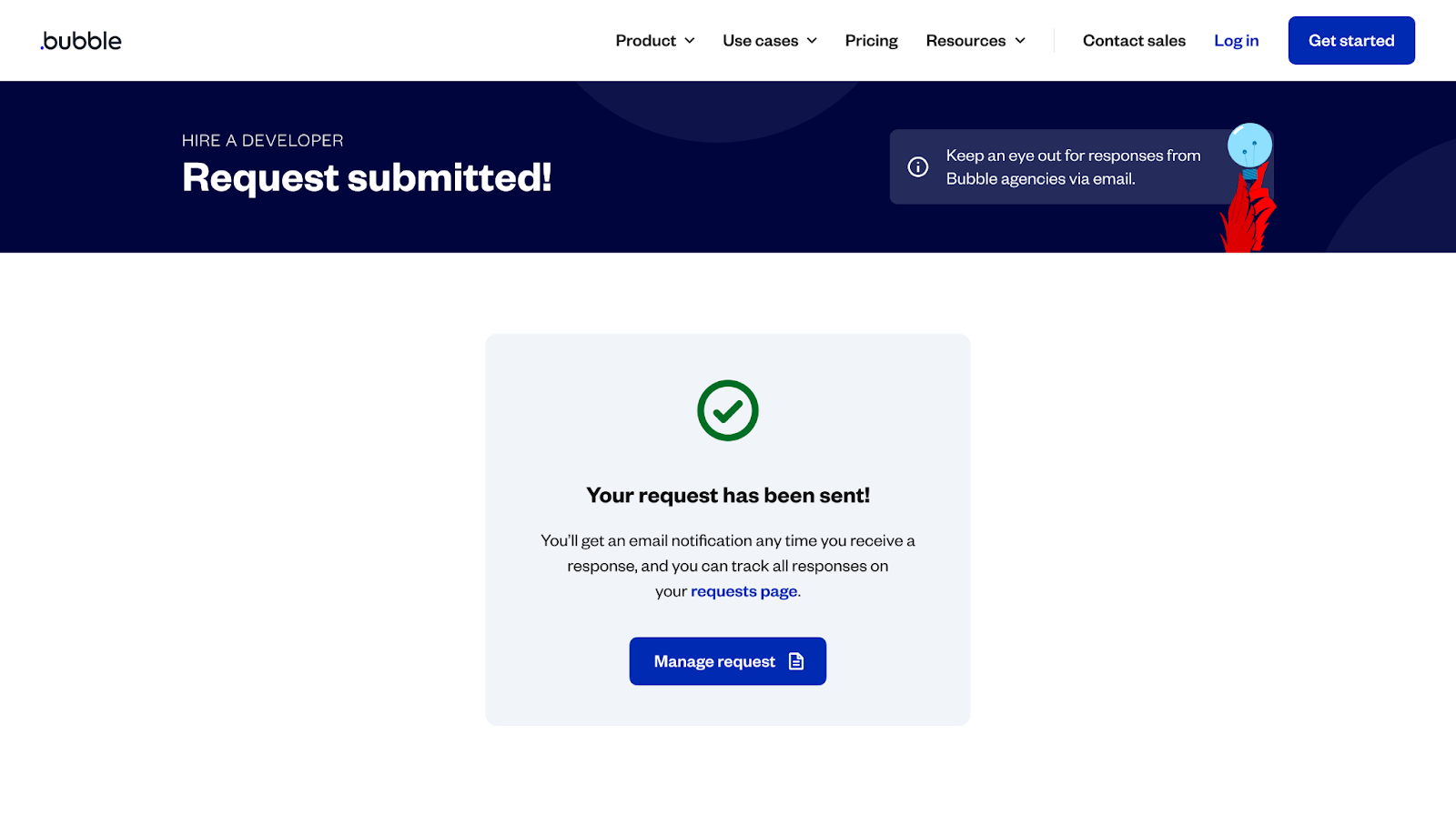
You will always receive three matches, but you can select Add more agencies to add two more to your request. This will give you a wider range of bids to choose from. Once you submit your request, you’ll hear back from agencies directly.
To learn more about an individual agency, just visit their agency profile.
What to include in your RFP
The Project details section of your RFP is your opportunity to tell developers all about your app — from the problem you’re solving and features you want to include to potential integration points and desired timeline. Here’s what you’ll want to include:
Features and actions
Think in terms of what you want people to be able to do in your app, and what happens before or after they do that thing. For example, will users need to sign up and create an account? Will they need to provide payment info or go through an onboarding flow? Are there different types of users with different permissions? You get the idea.
Examples
Sharing examples of similar apps, products, or businesses can help developers understand your product better. For example, “It’s like Uber for the substitute teacher industry,” or “I’d like an image carousel similar to this website.”
Integration points
Does your idea need to integrate with other tools or software? You might not know the answer, but try to think this one through. For example, if you’d like people to schedule appointments, you may need a calendar integration. Or, if you’d like to automatically trigger emails after certain actions, you may need an integration with an email provider. Popular payment platforms and AI are also common integrations.
Timeline
Even the simplest app can be more complex than meets the eye. While no-code developers can generally move much faster than traditional developers, you’ll still want to give your dev partner enough time for designing, building, and testing.
Budget
Be honest about your budget, but try not to limit yourself to the lowest-budget option. Think about whether you’re looking for a partner for a short-term, one-off need or a longer-term engagement as your project grows and evolves.
No-code developer budgets typically start around $2,000 USD, but that varies based on the project. Complex, scalable apps can run well into the six figures.
Example of a strong RFP project description
Ready to draft a great RFP? Here are a few examples that illustrate a reasonable level of detail.
Overview
Provide a short, one-sentence description of what your project does and who your target audience is.
- Example 1: “I want to build a workout tool for gym-goers that connects to your smartwatch and automatically detects and records your exercises.”
- Example 2: “I’m looking to create a custom online learning management system for my foreign language tutoring business, catered to young adults.”
Key features and details
Outline what your project will need to include — the more details, the better. This may include main features or pages, key actions users will take, integrations, and examples of similar apps or functionality.
- Example: My users will create accounts, register for courses, and then take practice questions in those courses. My app needs:
- A homepage
- Account creation/login
- Admin panels
- Admin course creation
- User course registration
- Multiple-choice practice questions
- Integrations:
- Google Calendar, Zoom, Google OAuth
- Similar apps:
- Coursera, Rosetta Stone, Duolingo
We can’t wait to see what you build
And that’s it! Here are a few examples of agencies and freelancers in our agencies marketplace, if you’re curious and want to start exploring.
Otherwise, head to the Hire a Developer portal and get that RFP submitted today — after all, there’s no time to waste.
Build your app on Bubble's Free plan. No need to upgrade until you're ready to launch your app.
Join Bubble
